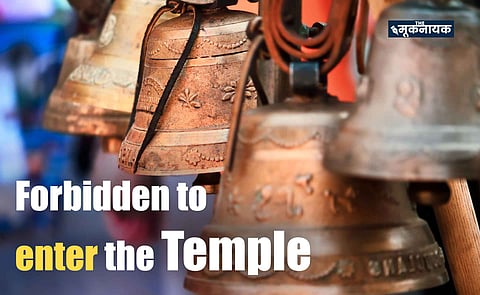
Tamil Nadu— The ongoing dispute over temple entry in the Melpathi village of Tamil Nadu has taken a distressing turn, with the Dalit community now issuing threats of conversion. The clash began when Dalit families in Melpathi village were barred from entering the Dharmaraj Draupadi Amman temple, which is under the administration of the state government's Hindu Religious and Charitable Endowments (HR&CE) department. Despite attempts to reconcile the conflicting parties through a peace meeting, the caste Hindu representatives remained unwavering in their refusal to allow Dalits inside the temple premises.
After two months of mounting tension, the temple was ultimately sealed due to vehement objections from upper-caste individuals who vehemently opposed the entry of Dalit community members. Exhausting all possibilities for a peaceful resolution after five rounds of negotiations, the authorities were left with no choice but to close the temple gates. Now, three months later, the Dalit residents of the village have issued a solemn ultimatum: unless officials take swift action against the perpetrators, they will renounce Hinduism and convert on August 15, India's Independence Day.
In a separate incident, Dalits in Eduthavainatham village, Kallakurichi district, were able to enter the Sri Varadharaja Perumal temple for the first time in January with the assistance of 300 policemen. Similarly, Dalits in Vengavalai village, Pudukkottai district, entered the temple last year amid protests from some caste Hindus.
This escalating crisis brings to mind the historic Meenakshipuram conversion episode that occurred over 40 years ago in February 1981. In the village of Meenakshipuram, located in the Tirunelveli district of Tamil Nadu, hundreds of individuals from the Scheduled Caste community converted to Islam. They were compelled to take such a drastic step due to the relentless discrimination and abuse they faced from the dominant Thevar community, belonging to the Other Backward Castes. Incidents such as being forbidden from entering the local temple or drawing water from the village well pushed these Dalit families towards religious conversion.
The Meenakshipuram mass conversion sparked significant controversy, drawing the attention of influential political figures such as Atal Bihari Vajpayee and Lal Krishna Advani, who visited the village, now known as Rehmat Nagar. In an attempt to woo back some of the converted individuals, promises of housing were made.
While the conversion to Islam meant sacrificing the benefits of reservation for the Scheduled Caste category, it provided an escape from the atrocities inflicted upon them. Thol. Thirumavalavan, a leader of the Viduthalai Chiruthaigal Katchi (VCK) and a Member of Parliament, asserts that this conversion to Islam elevated social mobility for these individuals, as supported by his doctoral thesis titled "Religious Conversion of Meenakshipuram Dalits."
In a parallel context, Gujarat has also witnessed mass conversions reflecting a growing awareness among Dalits regarding the injustices they face. Earlier this year, approximately 50,000 people from the Scheduled Caste community converted to Buddhism in a mass conversion ceremony held in Gandhi Nagar, Gujarat. Dalits in the state have long complained about pervasive caste-based discrimination, encompassing issues such as restricted temple entry, forced hair cutting, and discriminatory practices in renting accommodations. Recently, Vishad Hadmatiya, a rural settlement in Gujarat became the first village in India where all the Dalit families renounced Hinduism and embraced Buddhism.
Disturbingly, even minor acts of assertion have led to acts of violence, exemplified by the tragic murder of a Dalit individual for merely maintaining a mustache. However, after the Una Violence controversy, where seven Dalits were brutally beaten for skinning a dead cow, the Dalit community in Gujarat has experienced a surge in awareness and resistance against such atrocities.
It is within this context of mounting tensions and threatened conversions that the issue of temple entry and religious conversions in India generates substantial controversy. One can only hope that the urgency conveyed by the marginalized sections of Hindu society will spur reforms within the religion itself at the grassroots level, addressing the underlying injustices and fostering inclusivity and harmony.
Also Read:
You can also join our WhatsApp group to get premium and selected news of The Mooknayak on WhatsApp. Click here to join the WhatsApp group.